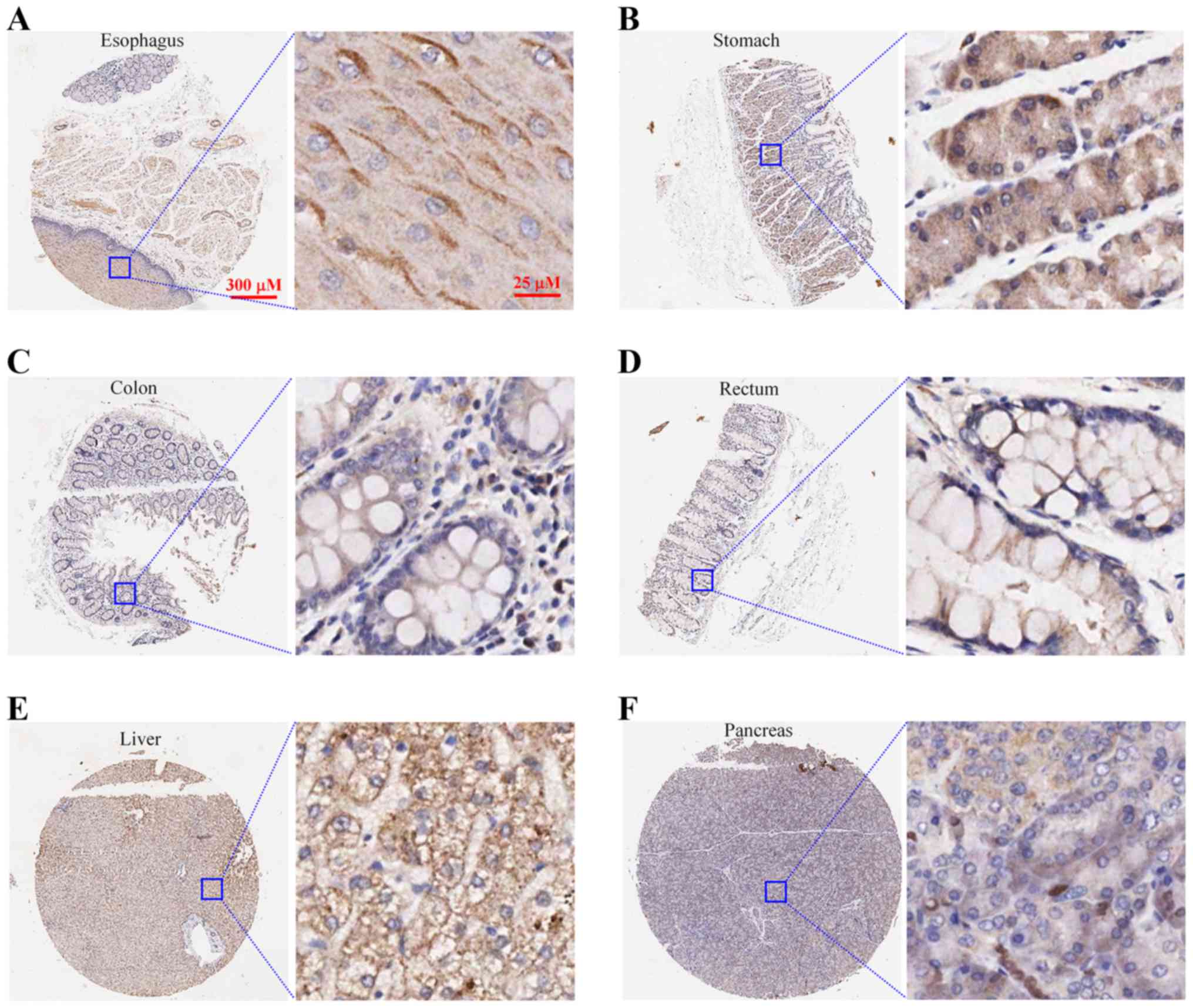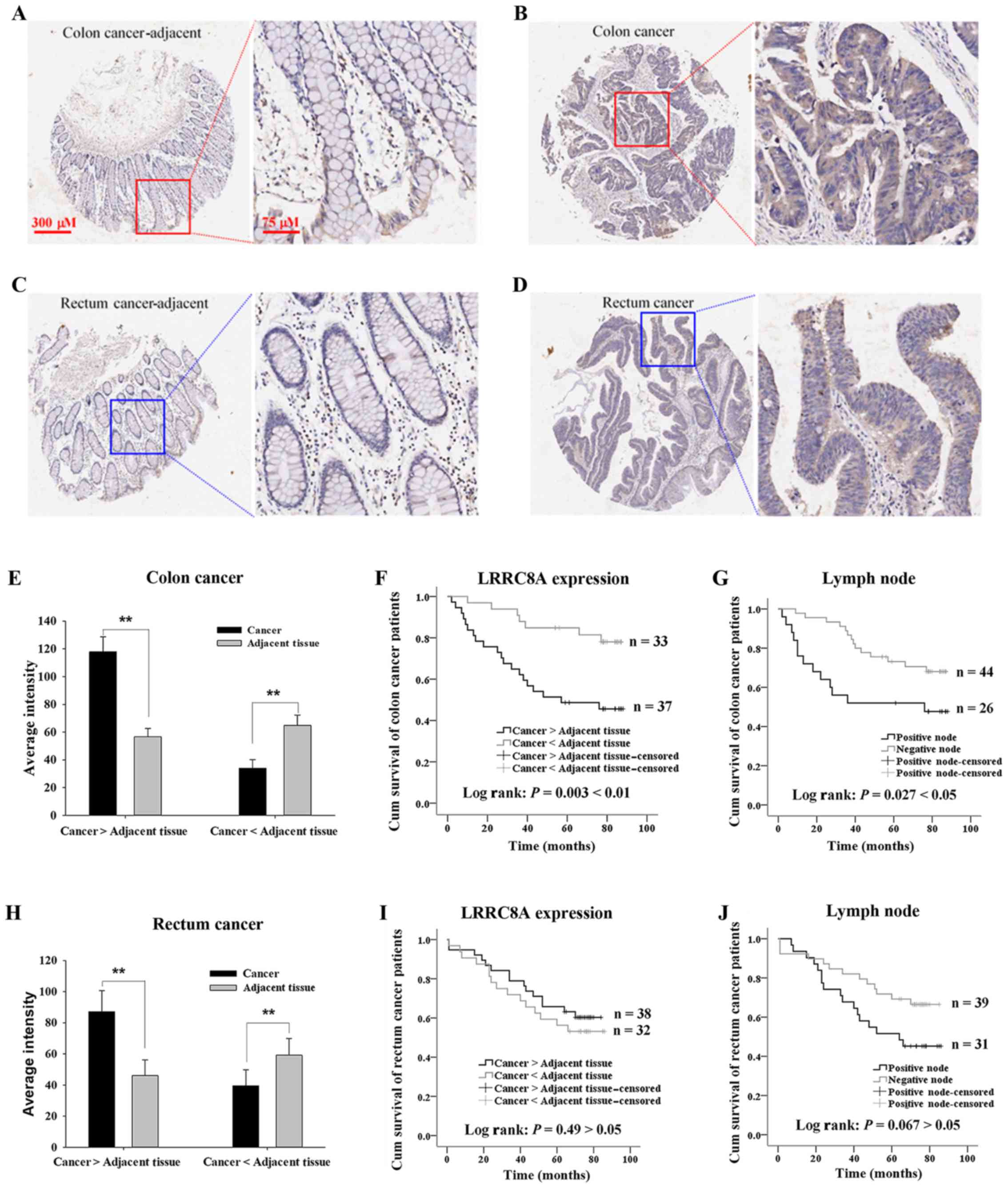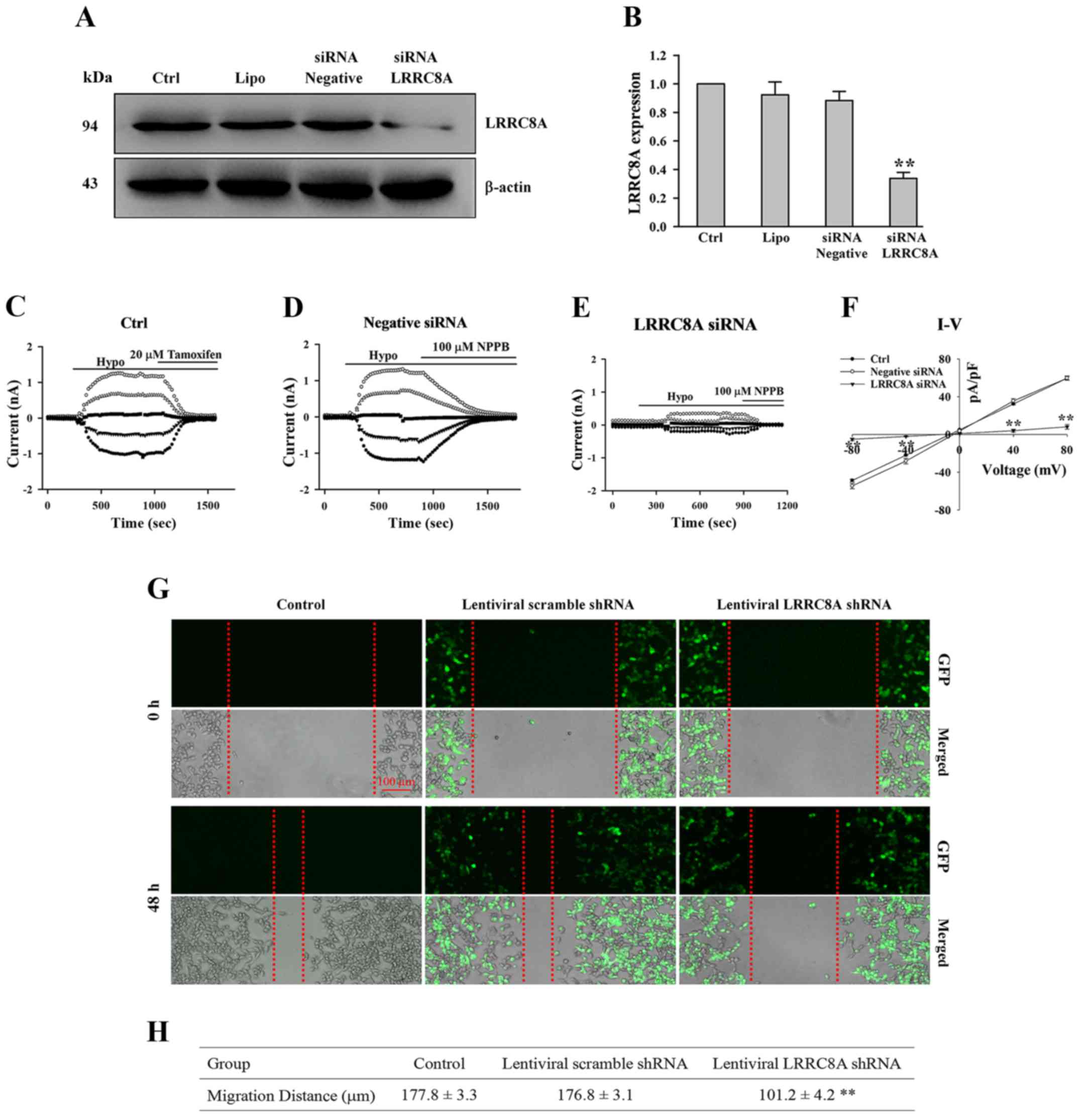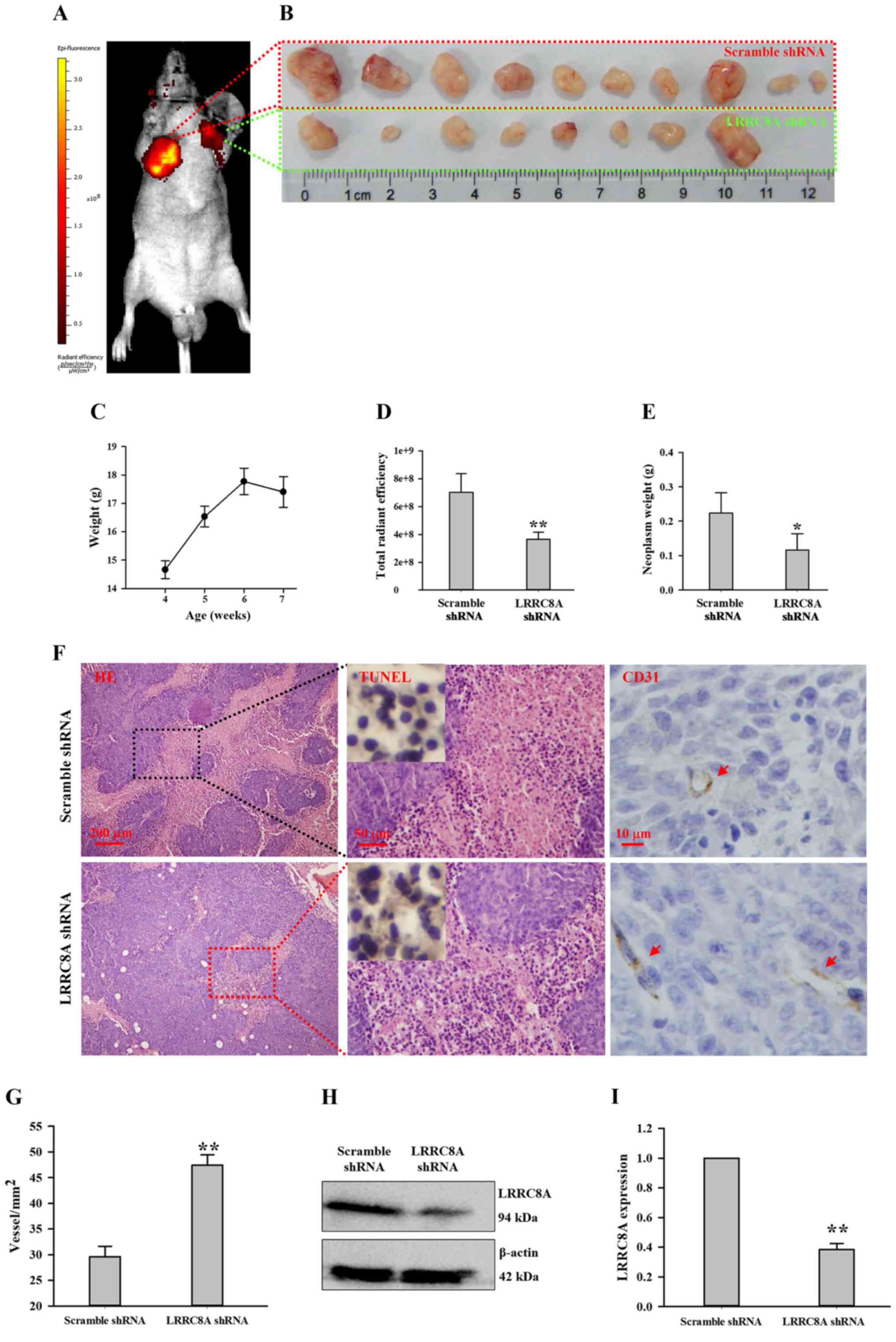|
1
|
McGuire S: World cancer report 2014.
Geneva, Switzerland: World Health Organization, International
agency for research on cancer, WHO press, 2015. Adv Nutr.
7:418–419. 2016. View Article : Google Scholar : PubMed/NCBI
|
|
2
|
Lang F, Busch GL, Ritter M, Völkl H,
Waldegger S, Gulbins E and Häussinger D: Functional significance of
cell volume regulatory mechanisms. Physiolo Rev. 78:247–306. 1998.
View Article : Google Scholar
|
|
3
|
Hoffmann EK, Lambert IH and Pedersen SF:
Physiology of cell volume regulation in vertebrates. Physiol Rev.
89:193–277. 2009. View Article : Google Scholar : PubMed/NCBI
|
|
4
|
Pedersen SF, Hoffmann EK and Novak I: Cell
volume regulation in epithelial physiology and cancer. Front
Physiol. 4:2332013. View Article : Google Scholar : PubMed/NCBI
|
|
5
|
Pedersen SF, Klausen TK and Nilius B: The
identification of a volume-regulated anion channel: An amazing
Odyssey. Acta Physiol (Oxf). 213:868–881. 2015. View Article : Google Scholar : PubMed/NCBI
|
|
6
|
Voss FK, Ullrich F, Münch J, Lazarow K,
Lutter D, Mah N, Andrade-Navarro MA, von Kries JP, Stauber T and
Jentsch TJ: Identification of LRRC8 heteromers as an essential
component of the volume-regulated anion channel VRAC. Science.
344:634–638. 2014. View Article : Google Scholar : PubMed/NCBI
|
|
7
|
Qiu Z, Dubin AE, Mathur J, Tu B, Reddy K,
Miraglia LJ, Reinhardt J, Orth AP and Patapoutian A: SWELL1, a
plasma membrane protein, is an essential component of
volume-regulated anion channel. Cell. 157:447–458. 2014. View Article : Google Scholar : PubMed/NCBI
|
|
8
|
Yamada T, Wondergem R, Morrison R, Yin VP
and Strange K: Leucine-rich repeat containing protein LRRC8A is
essential for swelling-activated Cl-currents and embryonic
development in zebrafish. Physiological Rep. 4:e129402016.
View Article : Google Scholar
|
|
9
|
Gaitán-Peñas H, Gradogna A, Laparra-Cuervo
L, Solsona C, Fernández-Dueñas V, Barrallo-Gimeno A, Ciruela F,
Lakadamyali M, Pusch M and Estévez R: Investigation of
LRRC8-mediated volume-regulated anion currents in xenopus oocytes.
Biophys J. 111:1429–1443. 2016. View Article : Google Scholar : PubMed/NCBI
|
|
10
|
Syeda R, Qiu Z, Dubin AE, Murthy SE,
Florendo MN, Mason DE, Mathur J, Cahalan SM, Peters EC, Montal M
and Patapoutian A: LRRC8 proteins form volume-regulated anion
channels that sense ionic strength. Cell. 164:499–511. 2016.
View Article : Google Scholar : PubMed/NCBI
|
|
11
|
Hyzinski-Garcia MC, Rudkouskaya A and
Mongin AA: LRRC8A protein is indispensable for swelling-activated
and ATP-induced release of excitatory amino acids in rat
astrocytes. J Physiol. 592:4855–4862. 2014. View Article : Google Scholar : PubMed/NCBI
|
|
12
|
Milenkovic A, Brandl C, Milenkovic VM,
Jendryke T, Sirianant L, Wanitchakool P, Zimmermann S, Reiff CM,
Horling F, Schrewe H, et al: Bestrophin 1 is indispensable for
volume regulation in human retinal pigment epithelium cells. Proc
Natl Acad Sci USA. 112:E2630–E2639. 2015. View Article : Google Scholar : PubMed/NCBI
|
|
13
|
Sirianant L, Wanitchakool P, Ousingsawat
J, Benedetto R, Zormpa A, Cabrita I, Schreiber R and Kunzelmann K:
Non-essential contribution of LRRC8A to volume regulation. Pflugers
Arch. 468:805–816. 2016. View Article : Google Scholar : PubMed/NCBI
|
|
14
|
Okada T, Islam MR, Tsiferova NA, Okada Y
and Sabirov RZ: Specific and essential but not sufficient roles of
LRRC8A in the activity of volume-sensitive outwardly rectifying
anion channel (VSOR). Channels. 11:109–120. 2017. View Article : Google Scholar : PubMed/NCBI
|
|
15
|
Zhang H, Li H, Yang L, Deng Z, Luo H, Ye
D, Bai Z, Zhu L, Ye W, Wang L and Chen L: The ClC-3 chloride
channel associated with microtubules is a target of paclitaxel in
its induced-apoptosis. Sci Rep. 3:26152013. View Article : Google Scholar : PubMed/NCBI
|
|
16
|
Xu B, Jin X, Min L, Li Q, Deng L, Wu H,
Lin G, Chen L, Zhang H, Li C, et al: Chloride channel-3 promotes
tumor metastasis by regulating membrane ruffling and is associated
with poor survival. Oncotarget. 6:2434–2450. 2015.PubMed/NCBI
|
|
17
|
Zhang H, Deng Z, Yang L, Luo H, Liu S, Li
Y, Wei Y, Peng S, Zhu L, Wang L and Chen L: The AQP-3 water channel
is a pivotal modulator of glycerol-induced chloride channel
activation in nasopharyngeal carcinoma cells. Int J Biochem Cell
Biol. 72:89–99. 2016. View Article : Google Scholar : PubMed/NCBI
|
|
18
|
Sawada A, Takihara Y, Kim JY,
Matsuda-Hashii Y, Tokimasa S, Fujisaki H, Kubota K, Endo H, Onodera
T, Ohta H, et al: A congenital mutation of the novel gene LRRC8
causes agammaglobulinemia in humans. J Clin Invest. 112:1707–1713.
2003. View
Article : Google Scholar : PubMed/NCBI
|
|
19
|
Zúñiga-Pflücker JC: New role identified
for LRR-containing proteins in T cell development. J Exp Med.
211:746–747. 2014. View Article : Google Scholar
|
|
20
|
Kubota K, Kim JY, Sawada A, Tokimasa S,
Fujisaki H, Matsuda-Hashii Y, Ozono K and Hara J: LRRC8 involved in
B cell development belongs to a novel family of leucine-rich repeat
proteins. FEBS Lett. 564:147–152. 2004. View Article : Google Scholar : PubMed/NCBI
|
|
21
|
Kumar L, Chou J, Yee CS, Borzutzky A,
Vollmann EH, von Andrian UH, Park SY, Hollander G, Manis JP,
Poliani PL and Geha RS: Leucine-rich repeat containing 8A (LRRC8A)
is essential for T lymphocyte development and function. J Exp Med.
211:929–942. 2014. View Article : Google Scholar : PubMed/NCBI
|
|
22
|
Choi H, Ettinger N, Rohrbough J, Dikalova
A, Nguyen HN and Lamb FS: LRRC8A channels support TNFalpha-induced
superoxide production by Nox1 which is required for receptor
endocytosis. Free Radic Biol Med. 101:413–423. 2016. View Article : Google Scholar : PubMed/NCBI
|
|
23
|
Sørensen BH, Nielsen D, Thorsteinsdottir
UA, Hoffmann EK and Lambert IH: Downregulation of LRRC8A protects
human ovarian and alveolar carcinoma cells against
Cisplatin-induced expression of p53, MDM2, p21Waf1/Cip1, and
Caspase-9/-3 activation. Am J Physiol Cell Physiol. 310:C857–C873.
2016. View Article : Google Scholar : PubMed/NCBI
|
|
24
|
Sørensen BH, Dam CS, Stürup S and Lambert
IH: Dual role of LRRC8A-containing transporters on cisplatin
resistance in human ovarian cancer cells. J Inorg Biochem.
160:287–295. 2016. View Article : Google Scholar : PubMed/NCBI
|
|
25
|
Li M and Xiong ZG: Ion channels as targets
for cancer therapy. Int J Physiol Pathophysiol Pharmacol.
3:156–166. 2011.PubMed/NCBI
|
|
26
|
Fraser SP and Pardo LA: Ion channels:
Functional expression and therapeutic potential in cancer.
Colloquium on ion channels and cancer. EMBO Rep. 9:512–515. 2008.
View Article : Google Scholar : PubMed/NCBI
|
|
27
|
Arcangeli A, Pillozzi S and Becchetti A:
Targeting ion channels in leukemias: A new challenge for treatment.
Curr Med Chem. 19:683–696. 2012. View Article : Google Scholar : PubMed/NCBI
|
|
28
|
Arcangeli A, Crociani O, Lastraioli E,
Masi A, Pillozzi S and Becchetti A: Targeting ion channels in
cancer: A novel frontier in antineoplastic therapy. Curr Med Chem.
16:66–93. 2009. View Article : Google Scholar : PubMed/NCBI
|
|
29
|
Mao J, Li X, Chen W, Xu B, Zhang H, Li H,
Wang L, Jin X, Zhu J, Lin G, et al: Cell cycle-dependent
subcellular distribution of ClC-3 in HeLa cells. Histochem Cell
Biol. 137:763–776. 2012. View Article : Google Scholar : PubMed/NCBI
|
|
30
|
Zhang H, Zhu L, Zuo W, Luo H, Mao J, Ye D,
Li Y, Liu S, Wei Y, Ye W, et al: The ClC-3 chloride channel protein
is a downstream target of cyclin D1 in nasopharyngeal carcinoma
cells. Int J Biochem Cell Biol. 45:672–683. 2013. View Article : Google Scholar : PubMed/NCBI
|
|
31
|
Zhang H, Li H, Liu E, Guang Y, Yang L, Mao
J, Zhu L, Chen L and Wang L: The AQP-3 water channel and the ClC-3
chloride channel coordinate the hypotonicity-induced swelling
volume in nasopharyngeal carcinoma cells. Int J Biochem Cell Biol.
57:96–107. 2014. View Article : Google Scholar : PubMed/NCBI
|
|
32
|
Ye D, Luo H, Lai Z, Zou L, Zhu L, Mao J,
Jacob T, Ye W, Wang L and Chen L: ClC-3 chloride channel proteins
regulate the cell cycle by up-regulating cyclin D1-CDK4/6 through
suppressing p21/p27 expression in nasopharyngeal carcinoma cells.
Sci Rep. 6:302762016. View Article : Google Scholar : PubMed/NCBI
|
|
33
|
Wang LW, Chen LX and Jacob T: ClC-3
expression in the cell cycle of nasopharyngeal carcinoma cells.
Acta Physiol Sin. 56:230–236. 2004.
|
|
34
|
Smits G and Kajava AV: LRRC8 extracellular
domain is composed of 17 leucine-rich repeats. Mol Immunol.
41:561–562. 2004. View Article : Google Scholar : PubMed/NCBI
|
|
35
|
Lee CC, Freinkman E, Sabatini DM and
Ploegh HL: The protein synthesis inhibitor blasticidin s enters
mammalian cells via leucine-rich repeat-containing protein 8D. J
Biol Chem. 289:17124–17131. 2014. View Article : Google Scholar : PubMed/NCBI
|
|
36
|
Planells-Cases R, Lutter D, Guyader C,
Gerhards NM, Ullrich F, Elger DA, Kucukosmanoglu A, Xu G, Voss FK,
Reincke SM, et al: Subunit composition of VRAC channels determines
substrate specificity and cellular resistance to Pt-based
anticancer drugs. EMBO J. 34:2993–3008. 2015. View Article : Google Scholar : PubMed/NCBI
|


















